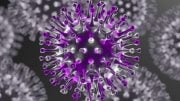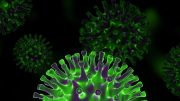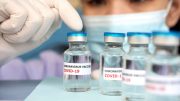
The figure incorporates variations to reflect/suggest virus mutations and also included the relevant Greek alphabet letters to emphasize this and contains the background of some of our figures. Credit: Murray Robertson, CC-BY 4.0
Vaccines are effective in decreasing hospitalization and deaths from COVID-19 infection but the emergence of viral variants of concern may diminish their efficacy. A study published on December 2nd, 2021, in PLOS Pathogens by Emma Thomson, Brian Willett, and colleagues at the MRC-University of Glasgow Centre for Virus Research, United Kingdom, and colleagues suggests that COVID-19 Delta variant may be more successful at evading the protective response of vaccines.
Mutations change the shape of the COVID-19 spike protein, preventing antibody recognition and enabling the virus to escape vaccine-induced immunity; however, the extent to which vaccine recipients are immune from the Delta variant is unknown. To quantify the capacity of different variants (Alpha, Beta and Delta) to evade protective immune response in vaccines, researchers analyzed serum samples collected from healthy people who had received either the Pfizer or Astra Zeneca vaccine. 156 people had received two doses and 50 people had received one dose. They exposed SARS-CoV-2 proteins in a virus model system to sera from vaccinated people and observed the antibody response, measuring how effectively antibodies prevented each variant from infecting cells (virus neutralization).
The researchers found that vaccines conferred protection from all COVID-19 variants but noted reduced antibody neutralization of both the Beta and Delta variants. Across all vaccinated individuals, the Delta variant reduced the immune response in recipients of both the Pfizer and Astra Zeneca vaccine 4.31 and 5.11-fold respectively. The study was not designed to measure vaccine efficacy directly, although it was in keeping with recent findings from Public Health England of slightly lower vaccine effectiveness against the Delta variant than previous variants. It also did not report on serological study of people who received the Moderna or Johnson & Johnson vaccines.
According to the authors, “While vaccines remain highly effective at preventing severe infection and death, ongoing monitoring of neutralization against new variants alongside studies of vaccine effectiveness are indicated as the virus continues to evolve over time, especially in vulnerable groups. Booster vaccines reduce the chance of being infected with currently circulating new variants. Newer updated vaccine designs are also likely to be required in time to prevent productive infection with newer variants of the virus.”
Reference: “Reduced neutralisation of the Delta (B.1.617.2) SARS-CoV-2 variant of concern following vaccination” by Chris Davis, Nicola Logan, Grace Tyson, Richard Orton, William T. Harvey, Jonathan S. Perkins, Guy Mollett, Rachel M. Blacow, The COVID-19 Genomics UK (COG-UK) Consortium, Thomas P. Peacock, Wendy S. Barclay, Peter Cherepanov, Massimo Palmarini, Pablo R. Murcia, Arvind H. Patel, David L. Robertson, John Haughney, Emma C. Thomson and Brian J. Willett, on behalf of the COVID-19 DeplOyed VaccinE (DOVE) Cohort Study investigators, 2 December 2021, PLoS Pathogens.
DOI: 10.1371/journal.ppat.1010022
Funding: The COVID-19 DeplOyed VaccinE (DOVE) study is funded by the Medical Research Council core award (MC UU 1201412; M.P) We acknowledge the support of the G2P-UK National Virology Consortium (MR/W005611/1) funded by the UKRI (M.P.,E.C.T.). COG-UK is supported by funding from the Medical Research Council (MRC) part of UK Research & Innovation (UKRI), the National Institute of Health Research (NIHR) and Genome Research Limited, operating as the Wellcome Sanger Institute (G.M., R.M.B., D.L.R., E.C.T.). W.T.H. is funded by the MRC (MR/R024758/1). N.L. and B.J.W. were funded by the Biotechnology and Biological Sciences Research Council (BBSRC, BB/R004250/1), G.T. was funded by the Department of Health and Social Care (DHSC, BB/R019843/1). The funders had no role in study design, data collection and analysis, decision to publish, or preparation of the manuscript. We are indebted to Therese McSorley for recruiting participants to the DOVE study. We thank all the researchers who have shared genome data openly via the GISAID Initiative.








They test for the flu since they’ve never isolated Covid-19. Which makes me wonder how they can tell there is a delta variant. They never isolated the virus but they use a test to show the damage of a solution does on monkey kidney cells then show the cellular debris as proof of the virus. So, they can use this method to claim an UNENDING! amount of variants. A lot of cancers and “viruses” are probably just different forms of parasites. Since the tests can’t differentiate between cold and flu and covid then doesn’t that mean ivermectin cures both the cold and the flu? Welcome to “they’ve been lying to us our entire lives about everything”. Get your Ivermectin while you still can! ivmpharmacy.com